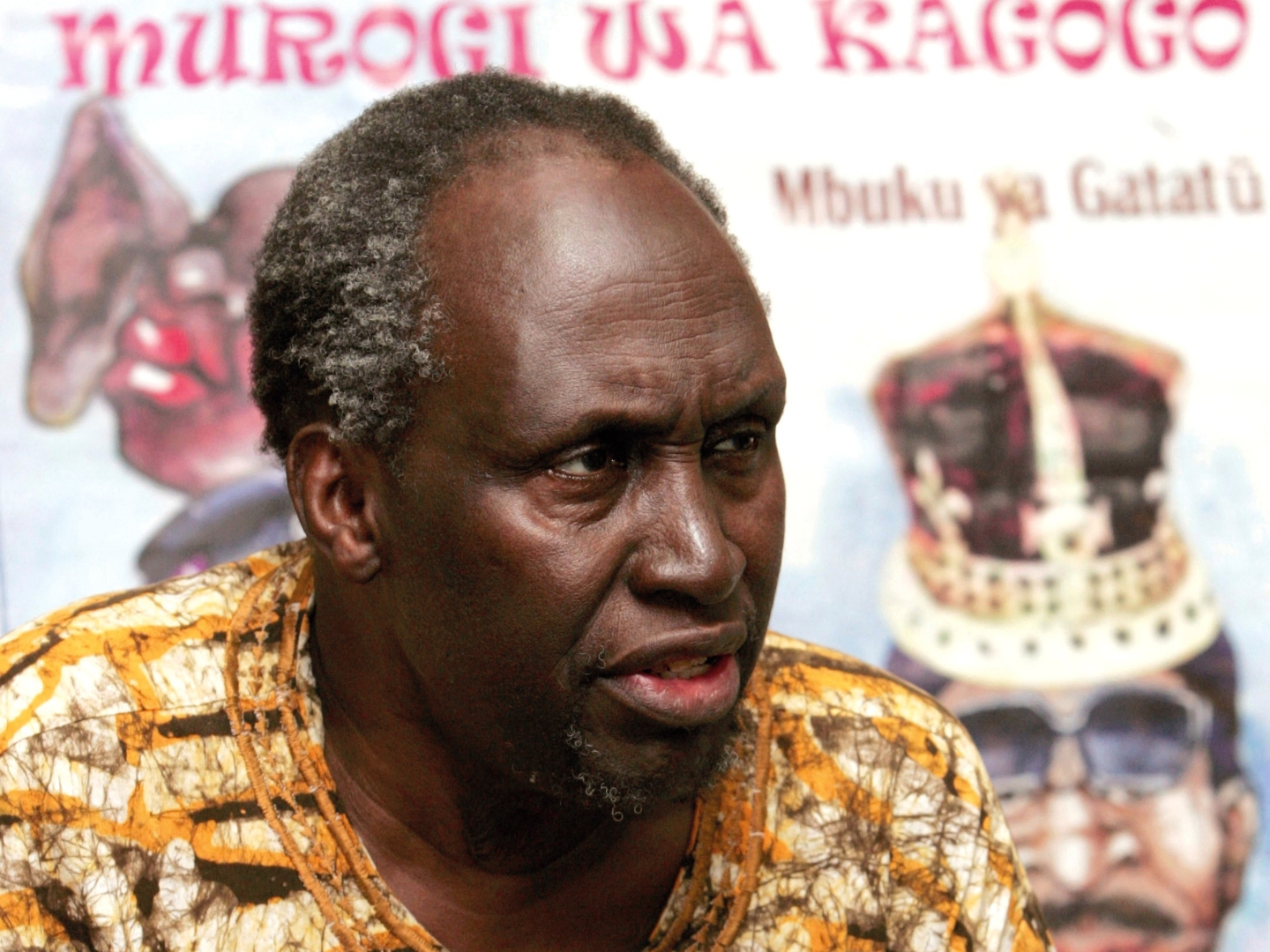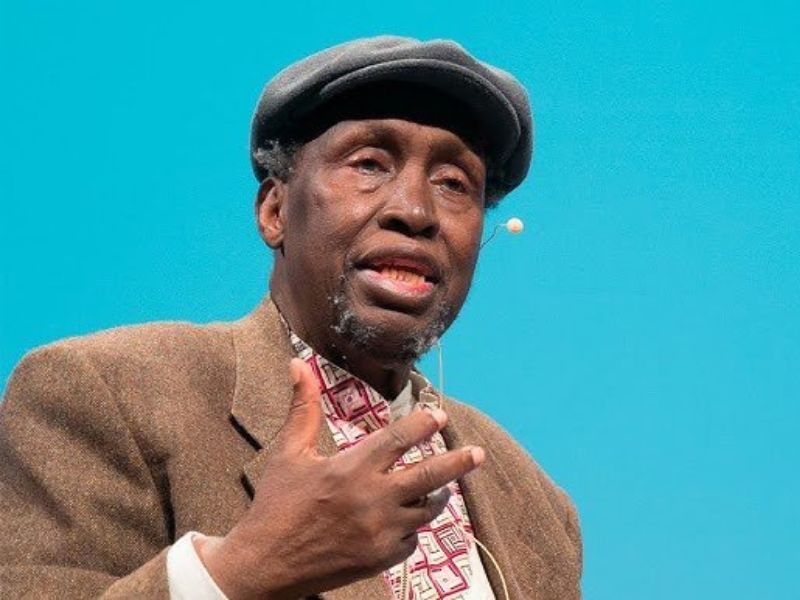
Ngũgĩ presenting his book Wizard of the Crow in 2007, released about 20 years after his novel Matigari (Photo: Antony Njuguna/Reuters)
“Written words can also sing” — Ngũgĩ wa Thiong’o
Ironic, even portentous perhaps, that two of Africa’s literary titans (and most overtly political ones) would come to capture the radical fortunes of Malaysia’s political life within just a few years.
In 1997, Kenyan Ngũgĩ wa Thiong’o featured as a keynote speaker at a conference on post-colonial literature organised by Universiti Kebangsaan Malaysia’s literature department. The conference was launched by then deputy prime minister Datuk Seri Anwar Ibrahim.
A well-known bibliophile, Anwar (praised even by the irascible V S Naipaul in his incisive, if scathing, book Among the Believers as “intelligent”, “attractive”) made his way to the main stage for his opening address, stopping to greet the great Ngũgĩ before delivering his address, laced intermittently with references to the author’s powerful work Decolonising the Mind.
Flattery might not get you everywhere with Ngũgĩ wa Thiong’o, but it could get you somewhere; I was seated next to him at the opening, and mid-way through the address he leant towards me and whispered this caution, “He is impressive; your country has to make sure he reaches where he is destined”.
Two years later, in 1999, the other African titan — Nigerian writer, playwright and Nobel laureate — Wole Soyinka arrived in Kuala Lumpur to address the Commonwealth Law Conference. An exalted, philosophical interrogation of human rights and justice followed, and laced in his speech were several references to the infamous “black eye” that had taken place in a Malaysian prison just a few months before, following the dismissal and jailing of deputy prime minister and minister of finance, Anwar and heralding, in Malaysian politics, the age of Reformasi.
Prior to using only his Gikuyu (the largest ethnic community in Kenya) name, Ngũgĩ wa Thiong’o was James Ngugi. While a student at the venerable Makarere University in Kampala, Uganda, he had managed to pass a manuscript to the grand figure of African literature — author of one Africa’s most enduring novels Things Fall Apart — Chinua Achebe.
The publishers William Heinemann had recently launched its African Writers Series. A Carribean Writers Series was to follow, featuring the likes of Naipaul and Derek Walcott. At the outset, the former abided by all the congenial Commonwealth principles of “cultural relations” and “better understanding” as books on its list made their way to literature curricula everywhere in the Commonwealth, prescribed as “standard texts” for students.
The series soon took on a radical life of its own, however, emerging as a serious platform for African writers writing against authoritarianism and political corruption of the African continent. Soyinka’s fierce first novel, The Interpreters, Kenyan Ali Mazrui’s forceful The Trial of Christopher Okigbo, and anti-apartheid (later murdered) activist Steven Biko’s tracts I Write What I Like were all part of the series’ list.
The manuscript passed to Achebe also made its way into the Heinemann series; and the novel Weep Not, Child — Ngũgĩ’s first — was published to wide acclaim. Subsequent novels — The River Between, A Grain Of Wheat, Petals of Blood, all published in that increasingly grand series (and now reissued as Penguin Classics) — established Ngũgĩ as one of the principal voices of not just East Africa and the African continent but of anywhere in the world.
Literary inventiveness, dramatic digs into history and an almost biblical dive into language characterised these early novels. “I still go back to the Old Testament for imagery; it’s still so much a part of me,” he once said.
body_pics.jpg

Born in 1938 in Kamiriithu village, in the Limuru district, just a little north of Nairobi, the young Ngũgĩ felt the harsh hand of history weigh mercilessly on him.
He was born to a polygamous father — and had “four mothers, the third being my biological mother” — before the start of WWII, and his childhood was shaken by the episode that propelled Kenyan history: the Mau Mau rebellion.
His father was forced to forgo his ancestral land — the catalyst for the Kenya Land and Freedom Army, or Mau Mau. Ngũgĩ lost a brother who fought for the Allied army, witnessed the British of the same Allied army rain bombs upon a third brother who joined the Mau Mau rebellion, discovered a fourth had turned out to be an informant, and lost another brother who was shot in the back during the period of Emergency by a British soldier for refusing to halt when commanded. That sibling, Gitongo, did not stop for failing to hear the command. He was deaf.
Much of what bedevilled Ngũgĩ’s own family was refracted upon larger Africa and the experience of subjugation under colonialism compelled his early novels. Many of these were written during a period at Leeds University in the 1960s — a period in that university’s life that was marked by an increasing lurch towards the political left. Soyinka also attended Leeds during this time.
Here, Ngũgĩ would read Karl Marx and the anti-colonial writings of Franz Fanon. He would also come across Barbadian novelist George Lamming’s In the Castle of My Skin, which would prove a most formative experience: “[It was] the first novel that painted a picture of myself in Africa — it spoke to me so directly,” he would recall.
His confrontation with the Kenyan regime came not from his novels but that more immediate platform — his plays.
Theatre had afforded Ngũgĩ the opportunity to engage with the broader community — the “keeping close to the ground” he often spoke of. His plays were community gatherings, typically featuring “non professional” actors, workers of the land.
It was I Will Marry When I Want, a play co-authored in Gikuyu, that gained the censure of the Kenyan authorities. He was imprisoned by the Jomo Kenyatta (once the hero of Kenyan independence) regime and held in solitary confinement.
Confinement proved a period of critical introspection that brought about a “psychological break” in regards to language. Writing in his native tongue — Gikuyu — was, for Ngũgĩ, a “homecoming: the only language I could use was my own” he would tell The Guardian.
While in prison, he wrote his first novel in Gikuyu (the first full-length novel in that language), Devil on the Cross. Deprived of paper, he scribbled it on toilet roll.
This radical choice — to write in an ethnic language — might have set out as a determined political act, but it set off a lifelong excavation into the very nature of language, the writer and the self.
“An African writer should write in a language that will allow him to communicate effectively with peasants and workers in Africa. In other words, he should write in an African language,” he asserts in an essay titled “On Writing in Gikuyu”.
He would do that for all his remaining work and set about translating them himself.
ngugi_books.png

Transcending the simply didactic, his forays into language, power and the existential were encapsulated in two significant books — now hallmarks in the post-colonial experience — Decolonising the Mind and Moving the Centre.
Ngũgĩ’s confrontation with successive Kenyan regimes resulted in exile for all his life, mostly in the US. “I never chose exile,” he would insist. “It was forced on me.”
The rise of Daniel Arap Moi to, in Ngũgĩ’s words, “the dictatorship” of Kenya resulted in a further extension of this exile. He was promised, after all, “a red carpet” if he ever dared to venture back.
When he did finally return to Kenya to launch his novel Wizard of the Crow, the great crowds that greeted his return to Nairobi belied the political enmity and vendetta that still haunted him. “I told them [the crowds] I wanted to be in touch with the everyday. But we returned to a nightmare.”
Two weeks after his return, Ngũgĩ and his wife, Njeeri, were violently attacked in their home. He was forced onto the floor with a gun put to his head, while one of the assailants raped his wife. “It wasn’t a simple robbery,” he would tell The Guardian. “It was political.” A trial was held, some were found guilty, but “I don’t know if we’ll ever reach the truth” was his conclusion.
Prolific in his later years: memoirs such as Wrestling with the Devil: A Prison Memoir, novels with a profound autobiographical element, retellings of folktales and myths and further novels — acerbic and scatological in tone — remained faithful to his quest to puncture the puff of the powerful. “Post-colonial dictators … There’s almost a comic element, except that they’re so dangerous,” he would remind.
Several notable, evocative and introspective books that delved into what was perhaps Ngũgĩ’s principal, lifelong preoccupation — language — were published by the marvellous Calcutta-based publisher, Seagull. Among these was the erudite, movingly self-reflective collection of essays on translation The Language of Languages.
ngugi_and_kids_1.jpg

Of the countless tributes, obituaries and words of praise that have continued to pour upon the passing of Ngũgĩ wa Thiong’o, the most sensitive and intimate remembrance was by Seagull’s publisher Naveen Kishore.
Writing in the online edition of the Indian magazine Frontline, Kishore offered a rare, highly personalised gaze into the writer-publisher relationship. It seemed to settle on the nature of ambiguity.
Some years before, Seagull had published Ngũgĩ’s captivating fable The Upright Revolution: Or Why Humans Walk Upright, in which he writes: “When humans learn from the network of organs, they do well; but when they see the body and the head as parties at war, one being atop of the other, they come close to their animal cousins who rejected the upright revolution.”
Call for justice, and innate sense? Yes. But also more … In a response to a poem that Kishore dedicated to him, Ngũgĩ might well have written his own epitaph in what, in this long vocation of writing and defiance, was his deepest desire for us all. Surmising his own novel Petals of Blood, he writes to Kishore: “Go away, Devil. Let love rule the world. Best — Ngũgĩ’.”
This article first appeared on June 9, 2025 in The Edge Malaysia.


